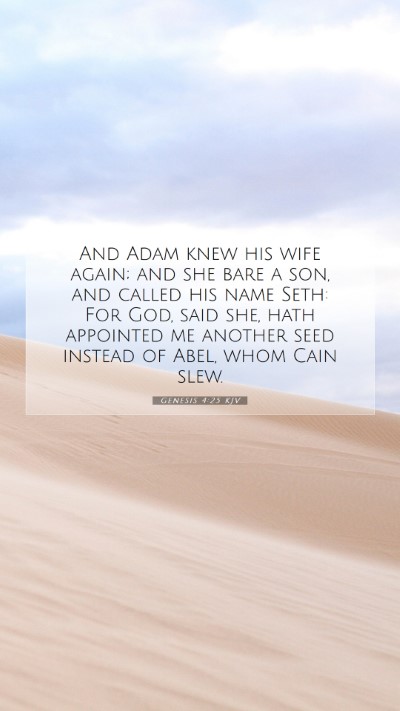Bible Verse Commentary on Genesis 4:25
Genesis 4:25 reads: "And Adam knew his wife again; and she bare a son, and called his name Seth: For God, said she, hath appointed me another seed instead of Abel, whom Cain slew." This verse marks a significant moment in the early biblical narrative, demonstrating themes of loss, divine providence, and the continuation of humanity.
Understanding Genesis 4:25
This verse encapsulates a pivotal shift for the family of Adam and Eve following the tragic event of Abel's murder by Cain. The birth of Seth symbolizes hope and God's intervention in restoring what was lost. Various commentaries provide deeper insights into the meaning of this verse.
-
Matthew Henry's Commentary:
Henry emphasizes the importance of Seth as a godly lineage that would carry on the worship of God, indicating that despite the sin introduced through Cain, God provides a means of redemption and continuity through Seth. The birth is seen not just as a biological continuation but as a spiritual one, aligning with God’s plans.
-
Albert Barnes' Commentary:
Barnes notes that Eve’s declaration, "For God hath appointed me another seed," suggests her recognition of God’s sovereign role in her life. It reflects not only a personal loss but God's promise for future generations. This verse highlights how God can bring forth hope after despair.
-
Adam Clarke's Commentary:
Clarke discusses the significance of the name "Seth," which means "appointed" or "placed." He elaborates on the theological importance of naming in the biblical context, asserting that Eve’s choice underscores her belief in God’s provision. Seth is positioned as a potential savior for the human race, illustrating the recurring biblical theme of God’s grace amid sin.
Biblical Exegesis
Genesis 4:25 serves as a crucial link between the early history of humanity and God’s unfolding plan for redemption. The themes reflect the early human experience of sin, loss, and hope, establishing a foundational understanding of God’s relationship with humanity.
Key Themes and Insights
-
Divine Providence:
The verse illustrates how, even in the midst of humanity's failures, God remains actively involved, ensuring the continuation of His creation and plan.
-
Hope After Tragedy:
Eve's proclamation indicates a heart that seeks to trust in God's future provisions, demonstrating an important lesson for believers facing difficulties.
-
Significance of Lineage:
Seth's birth is significant not only as a child of Adam but as the bearer of a lineage that would lead to further divine revelations and, ultimately, to Jesus Christ, highlighted in Luke 3:38.
Related Scripture References
- Genesis 5:3-5 - The genealogy of Adam through Seth.
- Hebrews 11:4 - Abel’s faith contrasted with Cain's actions.
- Luke 3:38 - The lineage tracing back to Adam through Seth, emphasizing the fulfillment of God's promise.
Application for Today
The understanding of Genesis 4:25 fosters rich discussions in bible study groups and can be explored in online bible study sessions. Here are areas of application:
- Finding Hope: Just as Eve found hope in Seth, believers today can find hope and healing through their faith in God after experiencing loss.
- Understanding God's Sovereignty: Reflecting on God's continuous guidance may encourage deeper trust in the face of life's challenges.
- Emphasizing Legacy: This passage invites reflection on what legacy one leaves behind, encouraging believers to live lives that further God's mission.
Conclusion
Genesis 4:25 is a profound verse that speaks to themes of loss, restoration, and divine purpose. By examining these themes through various bible verse commentaries, one gains valuable insights for understanding Scripture in a personal and applicable way. The narrative of Seth not only provides a historical account but also a theological basis for trusting in God amid life’s unpredictabilities.


